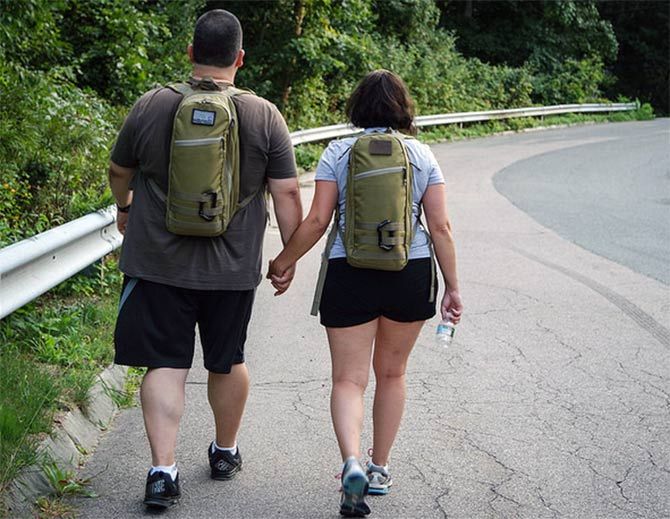Rucking (carrying weight on your back and walking) is the new workout trend to burn fat and get a stronger body.

Rucking is the new form of social fitness.
The word rucking refers to carrying weight on your back and walking, in a group setting. It burns fat, gives you a stronger body and the chance to enjoy some camaraderie.
How is it done?
Rucking is done in groups. Each person carries a back pack loaded with weight depending on how much they can and want to carry. Then you walk together for a specific distance.
Intensity can be increased by adding more weight to the bag or increasing the distance.
How often?
For cardiovascular and weight loss benefits, rucking should be done about 5-6 days a week for 30 minutes non-stop.
What's great about it?
The physical advantages are burning fat and getting a stronger body.
Rucking is a fun, uncomplicated way to workout. Since it is just walking, there is no specific skill you need to learn.
Being in a group there is plenty of motivation, time for chit-chat and some good jokes as you move.
What parts of the body does it help?
1. The cardiovascular system -- heart, lungs and the full circulatory system. This is what burns fat and builds stamina.
2. Muscles of the butt, thighs and calves are actively working. The abdominals and back play a supporting role.
3. There are psychological and social benefits too. It builds confidence, lowers stress levels and releases feel good hormones!
What does is not help?
1. Rucking is not a form of pure strength training, so it does not substitute for weight training workouts. There are some muscle groups that do not get worked at all in rucking.
2. It does not include any flexibility training.
What do you need?
1. A sturdy back pack
2. Weight to put in- water bottles, books, groceries... anything!
IMPORTANT
Weight check: You should be able to stand and walk erect. Anything that makes you bend forwards or backwards is too much. You should feel no strain on the back
3. Bottle of drinking water
4. Comfortable walking clothes
5. Well cushioned walking shoes
6. Bunch of enthusiastic people!
Where to Ruck?
You can ruck pretty much anywhere from jogging tracks to the roads. Try roads that go uphill and different terrains to challenge you a bit more.
Get your walk right
Stand tall, relax your shoulders, maintain a neutral pelvis. Your stride length should be comfortable. The heel must contact the ground first. Try to be as light footed as you can, to lower the stress on the joints.
What to watch out for?
If your back pack is causing you any discomfort in your back, neck or shoulders, decrease the weight immediately.
The shoulders may get compromised over time. The front of the shoulders may tighten, the back of the shoulders may become loose and the neck may get strained.
Consciously relaxing these muscles as you walk is important; as well as stretching them out post your workout. Some strengthening exercises must be performed for the back of the shoulders.
As with any sport or exercise, there is a risk of overuse injury, so if you do feel fatigue of the shoulders, legs or any of the muscles/joints, take a break for a couple of sessions now and again.
Now that you have all the info, grab your friends and go ruck!
Photograph: C.C. Chapman/ Creative Commons










 © 2025
© 2025